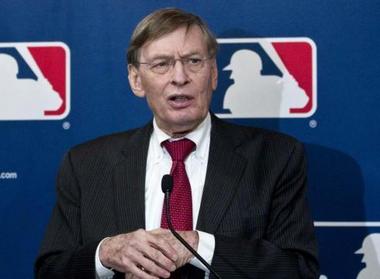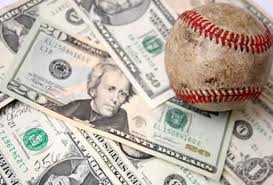
Money can buy you a lot of stuff but they say money can’t buy the really important things like love and happiness. Still it’s nice to think about what you might do if you had unlimited cash reserves.
I would get my dog his own live-in dog groomer for instance … tired of him stinking up my furniture … in fact I’m tired of him even looking at my furniture. It’s just as well though, if I had a ton of money I’d probably do really silly things with it like fortify my backyard bunker with a 50 year supply of Rice Krispies treats (they can double as soundproofing) and outfit my attack-pigeon training facility with state of the art equipment.
A lot of Met fans gripe about how the Mets are broke. The Mets are broke on account of a low-down-dirty weasel named Madoff who snookered our owners into his Ponzi scheme … for a really long time … this after they’d already been snookered into another Ponzi scheme by a different guy previously … I know, it’s funny how some guys get to be rich in spite of not being very bright.
It used to be that money could buy you wins in baseball. The Yankees and Red Sox have left a trail of success and championships over the past 20 years that is a testament to this. Earlier this season Brian MacPherson wrote a piece in the Providence Journal about the correlation between money and success in MLB, and he demonstrated, convincingly, that money no longer guarantees much.
MacPherson showed how 10 years ago a team’s payroll accounted for around 25% of its success. Since that time a lot has changed, namely revenue – its volume and dispersal. If there’s one aspect to Bud Selig’s legacy that stands out, it’s revenue. Baseball’s revenues have risen each year since 2003, surging from less than $4 billion in 2003 to more than $7 billion in 2011.
 Bud Selig has carefully navigated MLB into waters that are bubbling with cash. It reminds me of that H&R Block commercial where there’s an aircraft carrier with pallets of money on it. That’s pretty much MLB.
Bud Selig has carefully navigated MLB into waters that are bubbling with cash. It reminds me of that H&R Block commercial where there’s an aircraft carrier with pallets of money on it. That’s pretty much MLB.
Through Selig’s deft undermining of free agency via subtle and not so subtle rule changes in the new CBA — allowing for instance the retention of coveted free agents through qualifying offers by handicapping the receiving team with a lost draft pick, and by instituting significant penalties in the draft for paying over slot which for years and years allowed teams with deeper pockets to continue to fortify their farm systems, from revenue sharing to the additional wild card, baseball has done everything in its power to establish greater parity and invigorate smaller markets.
Even the international talent pool has been regulated with predetermined pools of money that teams can use to acquire talent. Smaller market teams are allowed to spend more in addition (as of 2014) to being allowed to trade up to half of that money, which could leave the international talent pool as a kind of last refuge of big spenders.
What we have today is a situation where teams like the Royals and the Orioles and (gasp) the Pirates have as decent a shot as the Red Sox and the Dodgers. Each sporting a cadre of home grown talent and young, cheap, under control stars. Consider for a moment that Baltimore, Kansas City, and Oakland, all playoff teams, were 15th, 19th, and 25th respectively in payroll, and two of those teams are still in the hunt. As MacPherson pointed out, the correlation coefficient between payroll and wins this season is 0.202, which is about like saying there is a correlation between monarch butterfly migration patterns and the consumption of pilsner type lagers in Saskatchewan … I mean, there could be.
Selig has taken a lot of heat over the years for his exploits and oversights, from collusion to contraction to steroids, he’s had his share of ethical quandaries. He has however hoisted upon our Mets a General Manager who is uniquely tailored to the task of adapting a team to the dynamics of baseball in this day and age. From his stockpiling to his sustainability doctrine to his disdain for free agency, Sandy Alderson has positioned the Mets to flourish in an aggregate economy driven by controllable farm-raised assets. He has accumulated a projectable surplus in value irrespective of the negligible contributions (to the parent club) of this surplus, because it can be traded — the value is intrinsic and was developed for nickles on the dollar when you consider what free agents go for.
From a business standpoint the approach is undeniable, if you grow your own you don’t have to pay a premium, and if you have enough of a surplus you can sell at a premium (don’t ask me how I know that!) … So basically, if you grow and train your own attack pigeons for instance you don’t have to worry about having a “critical mass” of birds on hand when religious zealots on bikes or Amway salespeople come knocking. Those of you who laugh I’m guessing never had a pigeon crash into your face … it is not pleasant. You still have to secure the right pigeons and train them — preferably with life-size cardboard cut-outs of Jeff Wilpon and Sean Hannity (I have my reasons!), but this only points to why it is so important to have great scouts and a good development program. In the end, if you can avoid having to rely on free agency in conditions that make it prohibitive, you place yourself at a competitive advantage, it’s that simple.
Money can only go so far. Looking back at the past few off-seasons free agency has not provided the broad selection of elite talent as in years past. Teams are finding creative ways to retain valuable players well into their prime years. We may bemoan a past that afforded us the flexibility to spend, but that past is gone in more ways than one. Baseball, is, was, and will always be, a young man’s game, and those organizations who covet the development of up-and-coming generations of players will continue to thrive.
















